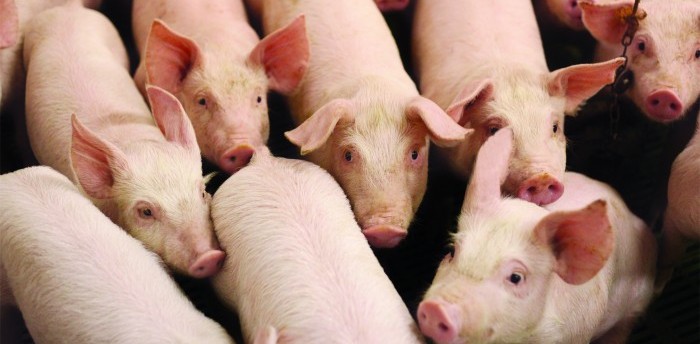Thursday’s pig industry crisis summit has delivered some progress towards a coherent plan to ease the pig backlog, but those commitments must now be implemented with real urgency to provide desperate pig farmers with some hope for the future, according to NPA chairman Rob Mutimer.
Mr Mutimer thanked Farming Minister Victoria Prentis for bringing producers, processors, retailers and their trade organisations together at Defra’s in London to try and find solutions to the deteriorating situation on pig farms.
“She certainly recognises the size and the urgency of the problems and there was a real focus on an immediate plan to reduce the current backlog of pigs on farms,” Mr Mutimer said.
“There was, however, no silver bullet – there was never going to be. The truth is we need more from the supply chain in terms of a workable plan. The challenge is to build on what we have got here and ensure every single organisation involved in the supply is focused on getting that backlog down and easing some of the intolerable pressure currently on pig producers.”
Summary of key points
Here are some of the key points to come out of the roundtable meeting:
A plan for the backlog – Minister Prentis has suggested that further groups are convened to look at the logistics of easing the backlog, including the capacity available in individual plants, as the basis for a coherent plan to get more pigs off farms.
Processors said they have been working to full capacity during weekdays, meaning further shifts would have to occur at the weekend. However, Defra’s latest monthly slaughter figures showed processors killed 986,000 pigs in November, 952,000 in December, but just 873,000 in January, suggesting the extra slaughter capacity is there.
The NPA will be writing to Minister Prentis to ask that processors set out a detailed plan that is regularly updated, including how many pigs they plan to slaughter per week, how many they actually have slaughtered, and the progress in reducing their backlog.
“After six months of this, the least producers can expect is some clarity on the future so they can plan properly – finding out on a Friday night how many pigs are going the next week is simply not good enough,” Mr Mutimer said.
Changes to the Government support package – linked to this, the Government is considering changes to its support package, including allowing fresh pork from pigs slaughtered under the Slaughter Incentive Payment scheme, to be sold on the domestic market. This would help get more pigs through the system and add value to the carcase.
Promoting British pork – the roundtable also discussed the need for retailers to work with processors to stock and promote more British pork as it comes through the system.
Labour shortages – all parts of the supply chain highlighted labour shortages as the primary cause of the problems being experienced by the industry.
While the temporary skilled worker visas have made little impact, with only just over 120 of the 800 visas available used, the NPA and others called for changes to the skilled worker route, including the removal of the unnecessary English language requirement and adding butchers to the shortage occupation list. However, this is not Defra’s policy area and little progress was made.
Minister Prentis did however agree to convene a meeting with the Home Office and interested parties to look at the issues.
Supporting producers – the NPA continues to call for a compensation package for producers who are taking a huge financial hit. Support for struggling pig producers has been made available in Scotland, Northern Ireland, France, the Netherlands, Poland and other European countries so far. There was no commitment from Defra on this.
More encouragingly, with some banks putting pressure on producers, Minister Prentis has pledged to talk to banks to make sure that they ‘look with leniency’ where pig farmers are experiencing difficulties.
Supply chain review – Minister Prentis, as previously flagged by Defra Ministers, has announced an ‘immediate review of Supply Chain Fairness in the pig sector’.
“The effects (of the pig industry crisis) on pig farmers have been devastating, and it is clear that many contractual arrangements are simply unfair. Our Agriculture Act includes provisions to address this unfairness, and we are launching an immediate review of Supply Chain Fairness in the pig sector,” she said.
Producers need hope
Mr Mutimer added: “This is an animal health and welfare, logistical, financial and mental health crisis all rolled into one. It has been going on for six months without any sign of it coming to an end – we have seen tens of thousands of pigs culled on farms, at least 40 producers have left the industry and the pig herd is contracting rapidly.
“Those that remain need some hope, something to believe in. In reality this is just the start and no more.
“We will continue to push for compensation and, crucially, for changes to allow more butchers to work in the pork industry.
“And, of course, we very much welcome the commitment for a review of pork supply chain. This as an opportunity to forge more stable and fairer contractual relations across the supply chain.”
“But while that is a longer-term issue, our overriding message is the British pig industry is running out of time – this outline plan must be turned into reality without any delay before it is too late.”
The current backlog of pigs on farm is estimated to be at least 200,000. The NPA is aware of 35,000 healthy pigs that have been destroyed on farm, although the true number is likely to be higher.
The NPA is also aware of 40 independent producers that have left the industry, and 30,000 sows (10%) that have been lost from the English breeding herd.




